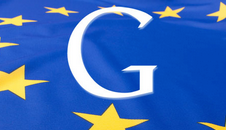EU Wants More Search Concessions, Google Defies French Authority
Round and round she goes. The European Commission is seeking a final round of “concessions” from Google in an 11th hour effort to settle potential antitrust claims against the company. EU Competition Commissioner Joaquin Almunia made public statements asserting that Google needs to deliver additional, revised proposals within weeks to avoid a formal antitrust proceeding. […]

EU Competition Commissioner Joaquin Almunia made public statements asserting that Google needs to deliver additional, revised proposals within weeks to avoid a formal antitrust proceeding. What we have now is a kind of high stakes game of chicken.
For well over a year there has been a very public back and forth between Google, the European Commission and Google’s rivals, who object to the various proposals floated to date. The chief concern or sticking point involves the presentation of “Google content” above third party organic links.
Google had proposed that three “rival links” be prominently featured at the top of search results to appease its competitors and the EU. However several sets of studies (many funded by Google competitors) have concluded this approach does little to drive additional traffic to competitors’ sites.
For more context, here’s a roundup of our recent coverage on the state of Google’s antitrust settlement proposals:
- EU: Google Antitrust Concessions “Unacceptable” As Second Study Condemns “Rival Links”
- Google To Get EU “Watchdog” As Part Of Antitrust Settlement
- New Concessions From Google Seek To Avoid EU Antitrust Penalties
- Google’s New European “Antitrust” Search Results: Here’s What They’ll Look Like
Separately last week the French privacy authority, National Commission for Computing and Civil Liberties (CNIL), slapped Google with the Google maximum fine available for violating French privacy rules with its “unified” privacy policy. The fine was 150,000 euros (roughly $203,000).
Google has long maintained that it is compliant with European privacy standards and rules and has declined to make any changes in response to French demands. The company is appealing the fine and ruling to the Conseil d’Etat, which is France’s “highest administrative court.”
Google is less concerned about the money than preventing the imposition of significant burdens on its integrated privacy policy, which allows it to combine data from any and all interactions with its services. That’s a key to better ad targeting and analytics in the brave new cross-platform era.
The EU opened its investigation in November 2010, and it has now taken 38 months of time with no resolution. The US FTC’s case involving Google took 19 months to reach a conclusion.
Opinions expressed in this article are those of the guest author and not necessarily Search Engine Land. Staff authors are listed here.
Related stories
New on Search Engine Land